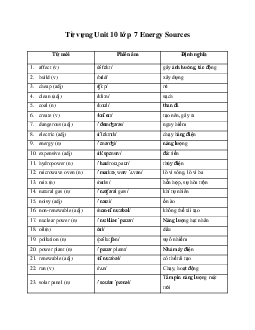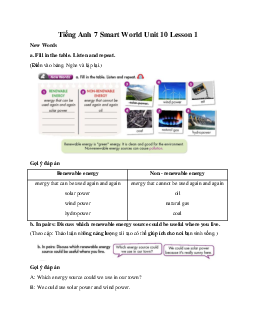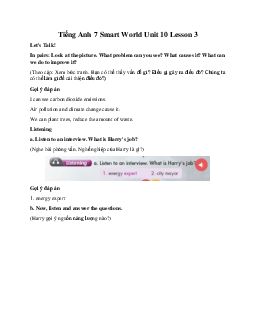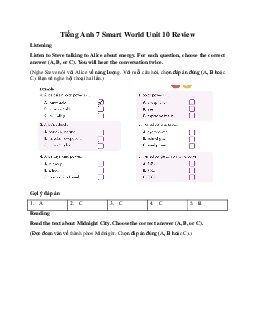







Preview text:
Tiếng Anh 7 Smart World Unit 10 Lesson 2 New Words
a. Match the words with the pictures.
(Nối từ với bức tranh tương ứng.) Gợi ý đáp án A. wind turbine B. solar panel C. power plant D. nuclear power
b. Add each word/phrase (5–9) to the correct column. Listen and repeat.
(Thêm từng từ /cụm từ (5–9) vào đúng cột. Lắng nghe và lặp lại.) Gợi ý đáp án Advantages Disadvangaes renewable non-renewable cheap to build expensive to build cheap to run expensive to run cheap to run cause pollution noisy dangerous
c. In pairs: Discuss which energies you think are clean to run or cause pollution.
(Theo cặp: Thảo luận về năng lượng nào bạn nghĩ là sạch để tiến hành hoặc gây ô nhiễm.) Gợi ý đáp án
I think wind power is clean to run.
I think natural gas causes pollution. Reading
a. Read the text and underline the correct title.
(Đọc văn bản và gạch chân chủ đề đúng.) Gợi ý đáp án
2. Comparing Different Energy Sources
b. Now, read and answer the questions.
(Bây giờ, đọc và trả lời câu hỏi.) Gợi ý đáp án
1. They are common because they aren't expensive to build.
2. Because natural gas is cleaner than coal.
3. Wind power plants are clean and cheap to run.
4. Solar power doesn't work at night.
5. Hydroelectric plants stop fish from moving freely.
c. In pairs: Which of the energy sources is the best choice for the future of your country?
(Theo cặp: Nguồn năng lượng nào là lựa chọn tốt nhất đối với đất nước bạn trong tương lai?) Gợi ý đáp án
A: Which of the energy sources is the best choice for the future of your country?
B: I think solar energy is the best choice for the future of my country. Grammar a. Listen and repeat. (Nghe và lặp lại.)
b. Write sentences using the prompts.
(Viết lại câu sử dụng gợi ý.) Gợi ý đáp án
2. Hydropower is cheap and clean to use.
3. Wind power is clean and renewable, but it’s noisy.
4. Natural gas is cheap, but it’s non-renewable.
5. Motorbikes are popular and cheap, but cause pollution.
6. Microwave ovens are convenient and save money.
c. Fill in the blanks using “and or , but”.
(Điền vào chỗ trống sử dụng “and hoặc , but”.) Gợi ý đáp án 1. but 2. but 3. and 4. and 5. and - but 6. and - but
d. In pairs: Make sentences about different types of transportation. Use the prompts.
(Theo cặp: Viết câu về phương tiện khác nhau sử dụng gợi ý.) Gợi ý đáp án
Airplanes are fast and convenient, but it’s pollution.
Cars are convenient, but it’s expensive.
Bicycles are clean, cheap and good for health. Pronunciation
a. "...and..." often sounds like /n/.
("...and..." thường được phát âm giống /n/.)
b. Listen. Notice the sound changes of the underlined words.
(Nghe. Chú ý sự thay đổi âm thanh của những chữ được gạch chân.)
c. Listen and cross out the sentence that doesn't follow the note in "a."
(Nghe và gạch bỏ câu không theo ghi chú ở phần a.) Gợi ý đáp án
Coal is cheap and eassy to use.
=> Sai vì không lược bỏ âm /d/ trong từ "and".
d. Read the sentences with the correct sound changes to a partner.
(Đọc câu đúng với sự thay đổi phát âm cùng bạn của em.) Practice Ask and answer. (Hỏi và trả lời.)
Can you tell me about wind power?
It's clean and cheap to run, but it's expensive to build. It's also... Gợi ý đáp án
A: Can you tell me about hydropower?
B: It's clean and cheap to run, but it's expensive to build. It's also need big rivers.
A: Can you tell me about solar power?
B: It's clean and cheap to run, but it's expensive to build. It doesn’t work at night.
A: Can you tell me about natural gas power?
B: It's cheap to build, but it's expensive to run. It also creates some pollution.
A: Can you tell me about coal power?
B: It's cheap to build, but it's expensive to run. It also creates pollution.
A: Can you tell me about nuclear power?
B: It's clean and cheap to run, but it's expensive to build. It also dangerous. Speaking
a. In pairs: Discuss the advantages and disadvantages of the energy sources, and say
why each would be good or bad for your city/town.
(Theo cặp: Thảo luận về lợi ích và bất lợi của nguồn năng lượng và nói tại sao mỗi nguồn
năng lượng tốt hay xấu đối với thành phố/ thị trấn bạn.) Gợi ý đáp án
Solar power is good for my city. Because it’s renewable, clean and cheap to run.
Coal is bad for my town. Because it’s nonrenewable, expensive to run and creates pollution.
b. Now, decide on the three best options, and what percentage each source should be.
(Bây giờ, quyết định trên 3 sự lựa chọn tốt nhất và mỗi nguồn năng lượng tương ứng với phần trăm bao nhiêu.) Gợi ý đáp án
I think 10% of our energy should come from wind power.
I think 40% of our energy should come from hydropower.



